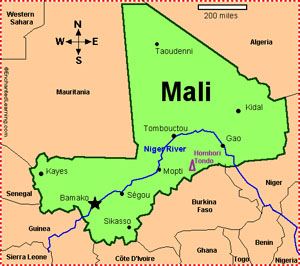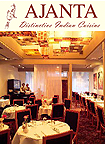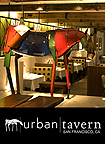
Food Crisis in Mali
By
FBWorld Team
Food
crises have plagued Mali in recent years due to drought
and recurring political conflicts.
The
January 2012 massacre of Malian soldiers by armed Tuareg fighters
in the far north precipitated the Malian coup in March of 2012
by the National Committee for Recovering Democracy and Restoring
the State (NCRDRS). That and the subsequent struggle in the north
of Mali involving two groups of Tuareg (Ansar Dine and the National
Movement for the Liberation of Azawad), both followed a severe
drought in the 2011-2012 season.
In
2011, Mali received only one month of rain, compared to the usual
three. As a result, only 11% of Mali's farmers were able to save
seed for the following year's planting season. This cut the country's
2012 seed supply by half, severely affecting the rice-growing
area in the Mopti region.i The drought forced pastoralists to
move their animals north six months earlier than usual that year
because of a lack of floodplain pasture along the Niger River.ii
This led to overgrazing in northern pastures as usual staggered
migrations were disrupted.iii Those pastoralists who did stay
in the southern region were trapped between the sparse floodplains
and the violent north. The increased grazing pressure on the land
led to conflicts with farmers, especially in the Mopti region.iv
With
the fall of Libya, arms flowed clandestinely into Mali's three
northern regions bordering Algeria. The regions of Gao, Timbuktu
and Kidal were overrun by a succession of armed groups-some claiming
to represent an Islamic "jihad," some involved in drug
trafficking and kidnapping of Westerners, and some claiming the
right to an independent state. An Islamist group (MUJAO) took
over the area and eventually displaced the armed Tuareg groups
claiming independence for "Azawad."
The
violent imposition of sharia law in Gao and Timbuktu led to the
internal displacement of 261,000 people and the emigration of
170,000 more.v Refugees fled, leaving everything they owned behind.
Displaced pastoralists also found themselves with no resources
for their cattle. Those who stayed in the north have been terrorized
by war and occupation. In the southern regions, especially Mopti,
farmers, whose stocks were already low, struggled to feed more
internally displaced people. Grain prices rose precipitously.vi
The
shortage of staple products due to the previous drought continued,
further complicated by the Islamist occupation in the north. A
tax was required from every farmer: one-twentieth of the harvest.
Petro shortages reduced areas irrigated by motor-power. Most importantly,
in some areas women were no longer allowed to leave their homes
for normal business activities in the market or to work alongside
men. This, and the massive displacement of people, decimated the
agricultural workforce, collapsing the economy in the occupied
regions. As a result, less than half of Gao's agricultural land
is being farmed today.vii
When French and Malian armies drove back the armed groups, Algeria
closed its borders to block the jihadists retreat to Algerian
territory.
Algeria
had been a main provider of staple foods oil, couscous, rice,
and milk for Kidal region, but food exports to Mali have decreased
by 50%. Internal trade has also been affected; the movement of
food to Kidal from Mopti has decreased by 40%, and, as the Mopti-Douentza-Gao
corridor to the south is disrupted by military activity and land
mines, the only way that food can reach Gao is via the Niger river
from Niger.
Because
of this, and the grain shortage, the price of millet is now 120%
higher than the five-year average.viii The departure of many Arab
merchants who fled Timbuktu and Gao for fear of retaliatory measures
and the fighting that resulted in the burning of Gao's central
market have made food inaccessible to many families.
Agriculture
is the mainstay of Mali's economy. The returning refugees of Gao,
Mopti and Kidal are struggling to prepare market gardens and rice
fields but they urgently need seeds, tools and irrigation pumps
for the region to survive the "lean season."
By Camille Vignerot and Tiffany Tsang, April 5, 2013
You
can help buy vegetable and rice seeds to help these farmers plant
in May

















